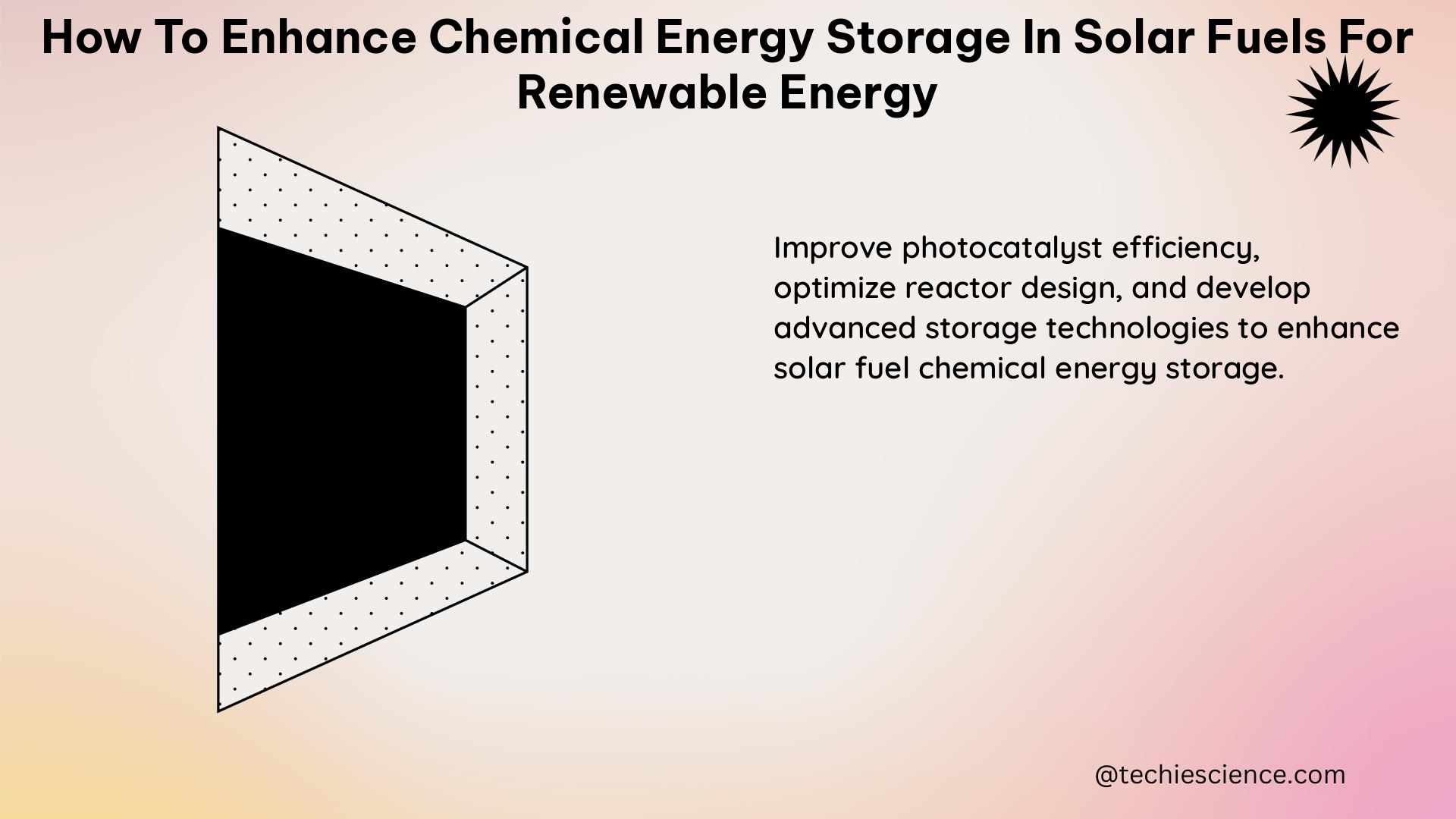Harnessing the power of the sun to store energy in the form of chemical bonds, known as solar fuels, is a promising approach to addressing the intermittency of renewable energy sources. To maximize the potential of solar fuels, it is crucial to enhance their chemical energy storage capabilities. This comprehensive guide delves into the technical details and strategies to improve the efficiency, storage capacity, and cost-effectiveness of solar fuel production.
Improving Solar-to-Fuel Conversion Efficiency
The efficiency of converting solar energy into chemical energy is a critical factor in the viability of solar fuels. To enhance this efficiency, researchers have explored various approaches:
- Photocatalytic Water Splitting: The process of splitting water using solar energy to produce hydrogen has a theoretical maximum efficiency of around 30%. However, current systems typically achieve efficiencies in the range of 10-15%. Strategies to improve this include:
- Developing advanced photocatalysts with higher light absorption and charge separation capabilities, such as metal-organic frameworks (MOFs) and perovskite materials.
- Optimizing the design of photocatalytic reactors to maximize light utilization and minimize recombination losses.
-
Integrating photocatalytic water splitting with other renewable energy technologies, such as solar cells, to create hybrid systems.
-
Photoelectrochemical Water Splitting: This approach combines photovoltaic and electrochemical processes to split water. Achieving high efficiencies requires:
- Designing photoelectrodes with optimal light absorption, charge transport, and catalytic properties.
- Employing tandem configurations with multiple photoelectrodes to capture a broader range of the solar spectrum.
-
Developing stable and efficient catalysts for the oxygen evolution and hydrogen evolution reactions.
-
Artificial Photosynthesis: Inspired by the natural process of photosynthesis, researchers are exploring ways to mimic the conversion of solar energy into chemical energy. Key focus areas include:
- Developing artificial light-harvesting systems with high quantum yields and efficient energy transfer.
- Designing robust and selective catalysts for the reduction of carbon dioxide and water to produce fuels like methanol and methane.
- Integrating artificial photosynthetic systems with energy storage and distribution infrastructure.
Enhancing Solar Fuel Storage Capacity and Duration

The storage capacity and duration of solar fuels are crucial for their widespread adoption as a renewable energy solution. Strategies to address these aspects include:
- Hydrogen Storage: Hydrogen has a high energy density of 33.3 kWh/kg, making it an attractive solar fuel. Challenges in hydrogen storage include:
- Developing advanced materials and systems for high-density, safe, and efficient hydrogen storage, such as metal hydrides, carbon-based materials, and cryogenic storage.
- Improving the volumetric and gravimetric energy densities of hydrogen storage systems to increase their practicality.
-
Addressing the challenges of hydrogen embrittlement and compatibility with existing infrastructure.
-
Liquid Solar Fuels: Fuels like methanol, ethanol, and ammonia offer higher energy densities and easier storage and transportation compared to hydrogen. Strategies to enhance their storage capacity and duration include:
- Optimizing the production processes to increase the yield and purity of these liquid solar fuels.
- Developing advanced storage and distribution systems, such as high-pressure tanks and cryogenic storage, to maximize their energy density and stability.
-
Exploring the use of additives and stabilizers to improve the long-term storage properties of these liquid solar fuels.
-
Integrated Energy Storage Systems: Combining solar fuel production with other energy storage technologies, such as batteries and thermal energy storage, can enhance the overall storage capacity and duration. This approach allows for the optimization of energy storage across different timescales and applications.
Reducing the Cost of Solar Fuel Production
The cost of producing solar fuels is a significant barrier to their widespread adoption. Strategies to address this challenge include:
- Material and Catalyst Selection: Utilizing earth-abundant and cost-effective materials and catalysts can significantly reduce the production costs. This includes exploring:
- Transition metal-based catalysts for water splitting and carbon dioxide reduction.
- Inexpensive and scalable synthesis methods for these materials.
-
Strategies to improve the durability and reusability of the catalysts.
-
Process Optimization: Improving the efficiency and scalability of solar fuel production processes can lead to cost reductions. Approaches include:
- Developing advanced reactor designs and process control systems to maximize the yield and minimize energy consumption.
- Integrating solar fuel production with existing energy infrastructure, such as power plants and refineries, to leverage existing assets and reduce capital costs.
-
Exploring modular and distributed production systems to enable scalable and cost-effective deployment.
-
Technological Advancements: Continuous research and development in solar fuel technologies can lead to breakthroughs that reduce production costs. Examples include:
- Improving the performance and cost-effectiveness of photovoltaic and photoelectrochemical systems.
- Developing novel catalysts and materials with higher activity, selectivity, and stability.
-
Advancing system integration and automation to streamline the production process.
-
Policy and Regulatory Support: Favorable policies and regulations, such as carbon pricing, renewable energy incentives, and research funding, can help drive down the cost of solar fuel production and make it more competitive with traditional fossil fuels.
Conclusion
Enhancing chemical energy storage in solar fuels is a multifaceted challenge that requires advancements across various fronts, including solar-to-fuel conversion efficiency, storage capacity and duration, and cost-effective production. By addressing these key aspects, researchers and engineers can unlock the full potential of solar fuels as a sustainable and reliable energy storage solution for renewable energy systems.
References:
- Solar Fuels: A Chemical Perspective
- Solar Fuels: From Photons to Chemical Energy
- Solar Fuels: Fundamentals, Technologies, and Implementation

The lambdageeks.com Core SME Team is a group of experienced subject matter experts from diverse scientific and technical fields including Physics, Chemistry, Technology,Electronics & Electrical Engineering, Automotive, Mechanical Engineering. Our team collaborates to create high-quality, well-researched articles on a wide range of science and technology topics for the lambdageeks.com website.
All Our Senior SME are having more than 7 Years of experience in the respective fields . They are either Working Industry Professionals or assocaited With different Universities. Refer Our Authors Page to get to know About our Core SMEs.